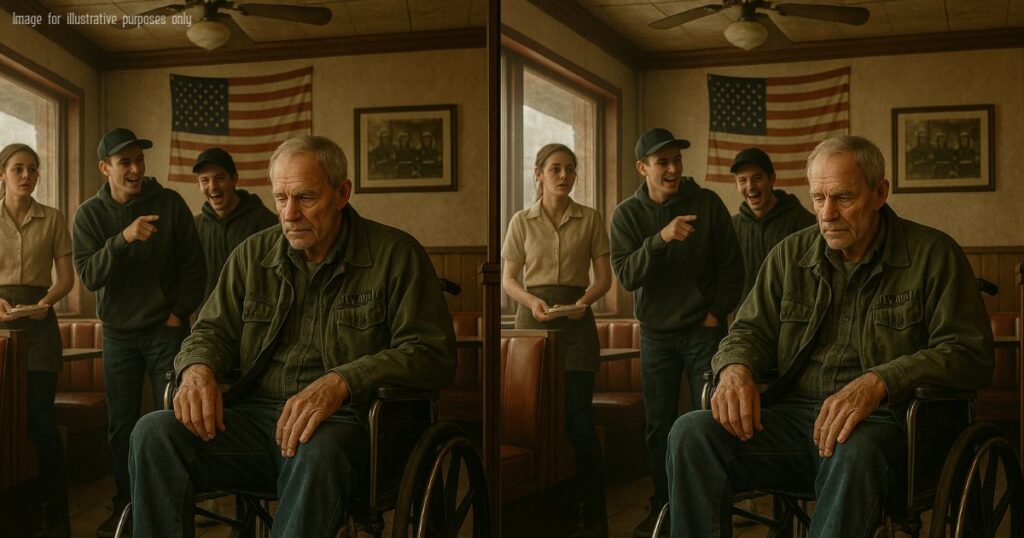The attack wasn’t just on him. It was on everything he’d fought to protect — and Tom wasn’t going to stay silent.
Tom wheeled forward slowly, the crackling of glass under rubber tires sounding like dry leaves under bootsteps in the jungle.
He didn’t curse. Didn’t yell.
He just bent down — careful, slow, the way his back allowed — and swept the shards aside with a worn snow shovel. No neighbors came out. No curtains moved. The world kept spinning.
Inside, he sat by the window and sipped cold coffee. Didn’t turn on the TV. Didn’t report it.
But something inside him — something that had slept for years — stirred.
That evening, he called someone he hadn’t spoken to in two decades.
“Ed?” he said.
A low voice grunted. “Jesus, Granger. You still breathing?”
Tom smiled. “Little slower, little louder, but yeah. You still got that old truck?”
“Rust holding rust together. Why?”
“Got something I need to do.”
The next morning, they rolled out before sunrise. Ed drove, hunched over the wheel like the weight of the world had finally bent him into a question mark. His beard was white now. His eyes still sharp. A Marine, through and through.
They didn’t talk much. Didn’t need to.
After a few hours on the road, they stopped at a strip mall on the edge of a bigger town. A flag store. A real one — not the kind selling beer koozies and bumper stickers, but where the clerk stood at attention when you walked in with a service pin on your collar.
Tom picked out a new flag. Full-size. Heavy stitching. Nylon strong enough to stand against a hurricane.
“Something happened?” Ed asked as they rolled it up.
Tom didn’t answer.
He didn’t need to.
Back in town, he climbed the ladder himself.
The arthritis screamed, but he didn’t care. With every rung, he remembered another name. Another face. Another story that didn’t make it into textbooks or movies.
At the top, he raised the new flag high above his porch. Tightened the rope. Saluted once.
Then he nailed a sign into the base of the pole. Painted by hand.
“This flag flew for the fallen. If you don’t understand that, knock and I’ll tell you their names.”
Neighbors noticed.
Some looked away.
But one by one, others began stopping by.
A teenage girl from two doors down knocked gently one afternoon. “My uncle died in Fallujah,” she said, quietly. “Can I help you water the flowers?”
A retired postal worker brought over a fresh bag of coffee. “For the old bones,” he grinned. “I remember you from the Fourth of July parade, ‘85. You always marched at the front.”
Even the boy from the diner — the one who’d followed him to the memorial — came by on his bike.
“People at school talk crap,” he said. “But I told ‘em about Barnes. And Ortiz.”
Tom looked him in the eye. “Good. But don’t waste time trying to fix ‘em. Just be better than they are.”
The attack didn’t make the news. No one arrested the kids. No justice came — not the kind you could see, anyway.
But the flag flew every morning. And at night, Tom lit a single bulb to keep it shining in the dark.
One morning, he found a letter in his mailbox. No stamp. No name.
“I saw what they did. And I saw how you stood.
My dad served too, and I always thought he came home alone.
But maybe you carried something for him too.
Thank you.
— A neighbor”
Tom folded the note into his wallet, right behind an old photo of Ellen holding their newborn daughter in ‘71.
The town didn’t change overnight. The vape shop stayed open. The kids still rode loud bikes down cracked sidewalks.
But something was shifting — slow, quiet, like spring thaw.
Tom started showing up at the high school. Just sat in the back of the history class some Fridays. The teacher, a woman barely thirty, welcomed him. Said the kids needed real voices. Not just footnotes.
He told them about how Doc Levens packed morphine with shaking hands and prayed over every wound. How Ortiz laughed the whole time his medevac lifted off. How war wasn’t glory — it was grit, and loss, and holding the line when no one was watching.
Some kids rolled their eyes.
But others — a quiet boy in a camo hoodie, a girl with her father’s dog tags on her backpack — they stayed after class to ask more.
One night, Tom sat on the porch with Ed and a bottle of something stronger than memory.
“Think it mattered?” Ed asked.
Tom didn’t answer at first.
He looked up at the flag — rippling slow against the stars, the moon catching the edge of every fold.
Then he nodded.
“Yeah,” he said. “Because it made ‘em stop. Made ‘em see.”
Ed leaned back and whistled low. “Damn, Tommy. You always were better with silence than speeches.”
Tom chuckled.
“Sometimes silence is the speech.”


